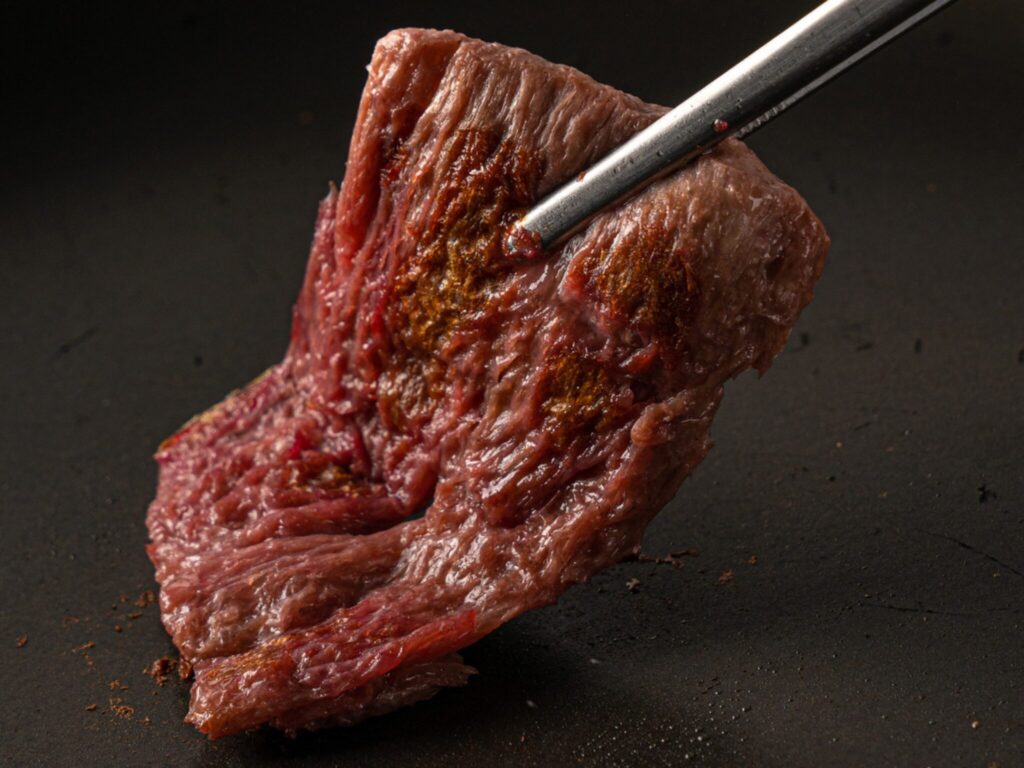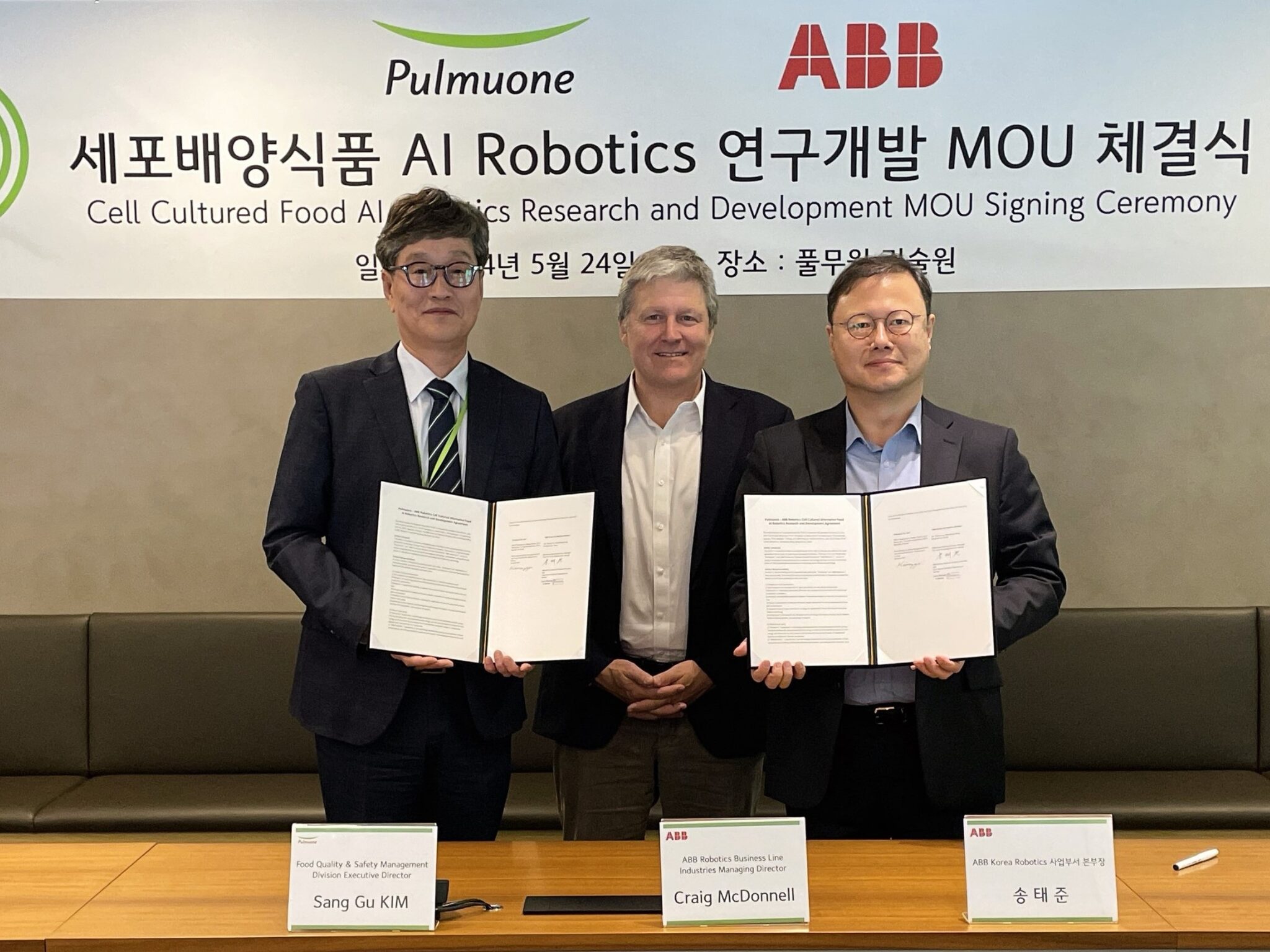Pulmuone Signs R&D Deal with Robotics Company ABB to Advance Cultivated Seafood Plans
4 Mins Read
South Korea’s Pulmuone is making its move into cultivated seafood with an R&D partnership with robotics company ABB.
Seoul-based plant protein giant Pulmuone has partnered with Swiss robotics company ABB to advance AI-assisted research and development into cultivated seafood production.
ABB’s expertise lies in electrification, automation and digitalisation technologies, and Pulmuone plans to leverage these capabilities to inform its efforts towards commercialising cultivated seafood.
The manufacturing process involves isolating cells from living fish, which are then used to make cell cultures. Pulmuone aims to automate this process with ABB’s robotics tech as part of its strategy to become a global future food leader.
“By combining Pulmuone’s specialised seafood cell cultivation core technology with ABB’s world-leading AI robotics technology, we expect to strengthen our technological competitiveness and create more synergy in advanced seafood food tech R&D,” said Sang-Gu Kim, head of food safety at the Pulmuone Technology Center.
Pulmuone looks to cultivated seafood to drive future growth

Pulmuone claims the partnership will be the first time AI and robot automation tech have been used for cell cultivation. “We will accelerate the establishment of an innovative mass production system for sustainable seafood cell-cultured food in the near future, leading to groundbreaking technological innovation,” said Kim.
In addition to the joint R&D for automating seafood cell cultivation, the collaboration will also see them analyse the production efficiency and productivity improvements achieved through the automaton process.
Plus, the partnership entails the protection of intellectual property for co-technologies and products, allowing both companies to safeguard their innovations. And they’ll also be able to mutually utilise research facilities and equipment, as well as exchange professional expertise.
Pulmuone, a market leader in tofu production for 40 years, hopes to reach mass production of cultivated seafood by 2026. The move is part of its drive to become an ESG leader internationally, as it aims to break even overseas this year. Last year, its sales reached nearly ₩3T ($2.1B). Its growth strategy is based upon four pillars: sustainable food expansion, global market expansion, strengthening ESG management, and future readiness through food tech.
The company has previously partnered with the likes of fellow Seoul-based startup Simple Planet (which it’s an investor in) to develop hybrid meat – a mix of cultivated and plant-based ingredients – and California’s BlueNalu to bring cultivated seafood to South Korea.
South Korea’s booming cultivated meat sector

The Pulmuone-ABB deal is yet another development in South Korea’s burgeoning cultivated meat sector. There has been a new wave of activity ever since the Ministry of Food and Drug Safety established a framework for regulatory approval of novel foods in February.
It came a year after the opening of the North Gyeongsang Cellular Agriculture Industry Support Center, a 2,309 sq m facility built over six years with a ₩9B ($7M) investment to develop biomaterials and support cultivated meat companies.
In April, the government created a regulatory-free special zone for the development of cultivated foods in the eastern province of Gyeongsangbuk-do. It harbours 10 startups that are working towards the commercialisation of cultivated meat, with ₩19.9B ($14.4M) set aside for the project.
And earlier this month, the Ministry of Oceans and Fisheries announced that it will invest ₩28.6B ($21M) in research funding for plant-based and cultivated seafood technologies.
“Korea’s leaders see the writing on the wall and understand that making meat more efficiently is a critical part of building a secure and sustainable food system in Asia,” Sam Lawrence, vice president of strategy and policy for Asia at the Good Food Institute, told Green Queen in April.
“There’s no pathway to decarbonising our protein supply without a rapid acceleration in future food manufacturing, which creates an enormous economic opportunity for nations that lead the way. By making bold public investments in cultivated meat development, Korea is signalling to food innovators around the world that they’re open for business,” he added.
A 1,110-person survey by the APAC Society for Cellular Agriculture in October revealed that 90% of South Koreans were willing to try cultivated meat at least once, and 39% were supportive of it being sold at supermarkets and restaurants. Price, however, is a key purchase driver, cited by 65% of respondents, followed by taste and texture (62%) and health/nutrition (48%).




